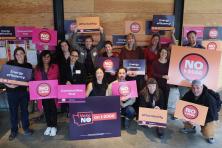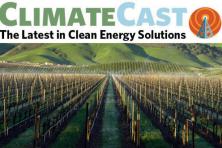Do Democrats oppose fossil fuel subsidies? Maybe, no, yes, kind of, and maybe
Taxpayers currently pay upwards of $20 billion a year in direct subsidies to fossil fuel industries, so many climate advocates applauded at the end of July when the Democratic National Committee added several climate action planks to the party’s draft platform, including support for ending subsidies for fossil fuels. The position was not particularly controversial—a similar provision was included in the party’s 2016 platform, and candidates Joe Biden and Kamala Harris both already pledged to end oil and gas subsidies.
Those same advocates were caught off guard when, amidst the Democrats’ four-day convention this week, party officials backtracked, stripping out the language ending fossil fuel subsidies. When asked for an explanation, a DNC spokesperson claimed only that the provision had been added “by mistake” in July. The Biden campaign did not immediately comment; Biden’s own climate plans have grown more ambitious as a result of pressure from advocates.
The West aflame: heat, wildfire, and fossil fuel "clean energy"
California continues to battle record setting wildfires during a record setting heat wave. CA residents continue to endure smoke-filled skies, triple-digit temperatures, and an ongoing COVID-19 crisis; in the midst of these triple crises, people are dealing with controversial rolling electricity blackouts. While the state’s forests have long been fire prone, the link between climate change and accelerated, larger, and hotter fires is inextricable. So is CA digging its hole deeper? New reports show the complexity of decoupling CA’s legacy of fossil fuel production and the state’s efforts to transition to a clean energy economy with recent drilling permits in the Lost Hills Oil Field to “incorporate solar power into drilling operations to expand the use of fracking and oil production.” This activity is hardly climate friendly and continues a long practice of environmental racism, as the nearby town of Lost Hills is 97% Latino with close to a third of residents living below the poverty line.
A storage surge
Announcements of new centralized battery storage projects have been coming fast and thick from across the country. Recent advances in lithium-ion battery technology have helped expand their applications beyond personal electronics and electric vehicles. Many utilities are now featuring batteries fed by renewable sources as a key component of their 100% clean energy plans, and critical during power outages.
Yes, it is getting hotter
A recently released study has predicted that people living in US cities could face nearly 30 times more exposure to extreme heat by the year 2100. Over at Vox, a groundbreaking new study showing that "the effects of air pollution are roughly twice as bad as previously estimated," and fossil fuels are to blame.
Welcome news: cleaner, heavy-duty vehicles coming soon
New projections on the falling cost of EV batteries show the price of an electric vehicle will equal the cost of a gasoline vehicle by as early as 2025. Transportation emissions remain stubbornly high—over 25% of U.S. emissions—and in addition to upping EV adoption among consumers, replacing medium and heavy duty diesel trucks with zero-emission electric options is critical to air quality improvement along U.S. highway corridors. With reports of efforts to electrify whole fleets, like Republic’s nascent efforts in Phoenix, and growing excitement around upcoming zero-emission light duty trucks, all-electric is consistently getting closer than previously imagined.
One Thing You Can Do
Get ready for 2020 and be an active, committed participant in our democracy: Vote! Encourage your family, friends, neighbors, and colleagues to vote. Let candidates know that your support depends on their commitment to climate and racial justice.
Voter Registration resources:





